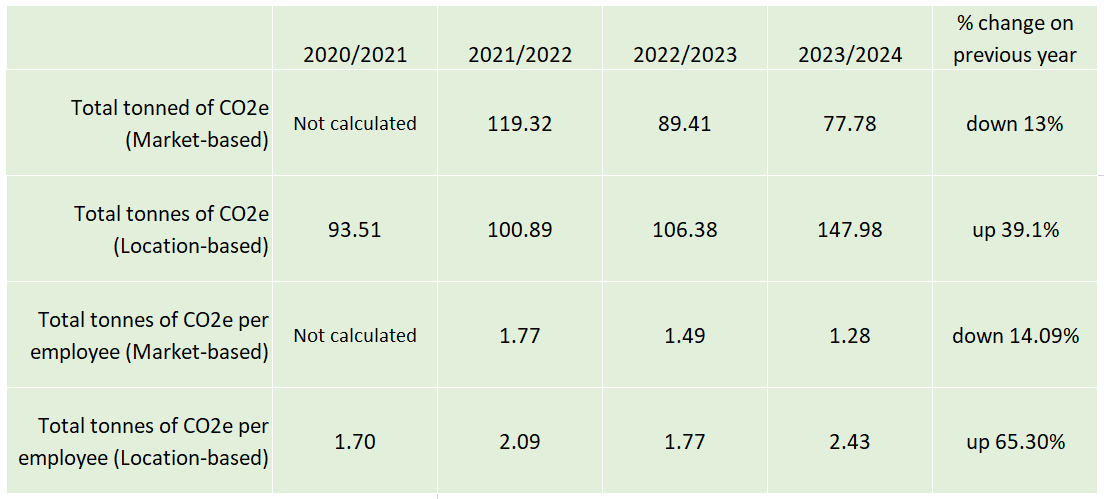Measuring and offsetting our carbon footprint
Updated: 28 Jan 2025
We are a Carbon Neutral Plus Organisation and have been calculating and offsetting our annual carbon footprint since 1 April 2020. Such measurement has resulted in a number of changes to how we operate, with the focus being on the reduction of greenhouse gas emissions – today and into the future.
Our carbon footprint
 Between 1 April 2023 and 31 March 2024, 77.78 tonnes of CO2e (market-based) was identified as being produced through the operations of the Oddfellows’ Liverpool and Manchester offices*, and its associated transport activities, which includes our financial services brand, Unity Mutual. This amount has now been offset.
Between 1 April 2023 and 31 March 2024, 77.78 tonnes of CO2e (market-based) was identified as being produced through the operations of the Oddfellows’ Liverpool and Manchester offices*, and its associated transport activities, which includes our financial services brand, Unity Mutual. This amount has now been offset.
The amounts, calculated by Carbon Footprint Ltd, include fuel consumption, company-owned vehicles, staff business travel and homeworking. And, for the first time, emissions as a result of employee commuting have been included in the 2023/2024 assessment.

What is a carbon footprint?
Our carbon footprint is the total amount of greenhouse gases generated by our actions and measured in units of carbon dioxide equivalents (CO2e).
Location and market-based calculations
Location-based and market-based carbon footprint calculations are the two required methods for estimating the greenhouse gas emissions from electricity consumption.
‘Location-based’ estimates the emissions from the electricity delivered to a company by using the average emissions intensity of the region's power grid.
‘Market-based’ estimates the emissions from the electricity a company purchases, including from green power contracts, renewable energy projects, and renewable energy certificates (RECs).
The downward shift in our reported market-based figure for 2023-2024 is a result of the Society switching its energy tariffs from brown to green, as well as the recent installation of LED lighting.
A green electricity tariff is when suppliers make a promise to match all or some of the electricity used with renewable energy.
Reducing carbon emissions
The Oddfellows’ CEO, Jane Nelson, said: “Our focus is to keep learning through our assessments and to make incremental changes to the way we operate so we can bring our greenhouse gas emissions down and play our part in tackling climate change.
“Our office’s electricity usage remains our largest area of carbon emission production, however, we are on a green energy tariff to minimise our overall impact. All building lighting operates on a timer or sensor system and is LED.”
Jane added: “This assessment year was the first time employee commuting was included. 43% of our market-based footprint was attributed to this, something we’ll monitor and discuss in team meetings.
“We’ll also continue to encourage for meetings to be remote if face-to-get-togethers aren’t necessary, as staff business travel accounts to 31% of our market-based footprint.”
Carbon offsetting
To offset our market-based carbon footprint for 2023-24, the Society has funded a range of carbon dioxide-saving initiatives around the world. These include:
- Ghana: Reforestation of degraded forest reserve areas
- Zambia: The Western Province Safe Water Project
- Thailand: The Chaiyaphum Wind Farm Power Project
- Turkey: The Arca Hydro Electric Power Project
- India: Bundled Solar Power Project by DJ Malpani and Giriraj Enterprises
Net Zero ambitions
“We aim to become Net Zero as a Society. This is where we reduce our carbon emissions to the lowest amount possible and offset as a last resort,” said Jane.
“While we are on that journey, our promise is to always offset our carbon footprint.”
To date, the annual assessments, and Carbon Neutral Plus Organisation status, remain in relation to both the Oddfellows’ Liverpool and Manchester offices’ operations*. However, the Society’s UK Branch network will be encouraged to adopt similar approaches to measure, reduce and offset their carbon footprint.
*The Society’s next annual carbon footprint assessment will cover the period of 1 April 2024 to 31 March 2025 and will no longer include the Liverpool office's operations due to the sale of the premises.
Further reading
View further information about how the Society is reducing its carbon footprint and managing the risks of climate change.
The BBC's What is climate change? A really simple guide
Gov.uk's Climate change explained
United Nations' Climate action
DISCLAIMER: Links to third-party sites do not constitute an endorsement by the Oddfellows and use of the advertised products and services is entirely at your risk. The Oddfellows does not accept any liability or responsibility for any third party material on other websites.






